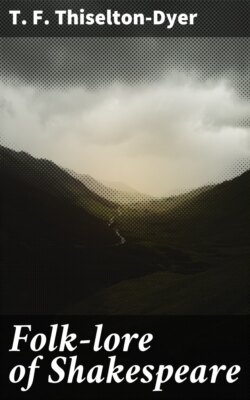Читать книгу Folk-lore of Shakespeare - T. F. Thiselton-Dyer - Страница 25
На сайте Литреса книга снята с продажи.
Оглавление“Like foggy south, puffing with wind and rain.”
And again, in “1 Henry IV.” (v. 1):
“The southern wind
Doth play the trumpet to his [i. e., the sun’s] purposes; And by his hollow whistling in the leaves Foretells a tempest, and a blustering day.”
A popular saying to the same effect, still in use, tells us that:
“When the wind is in the south,
It is in the rain’s mouth.”
Again, in days gone by, the southerly winds were generally supposed to be bearers of noxious fogs and vapors, frequent allusions to which are given by Shakespeare. Thus, in “The Tempest” (i. 2), Caliban says:
“a south-west blow on ye
And blister you all o’er.”
A book,[149] too, with which, as already noticed, Shakespeare appears to have been familiar, tells us, “This southern wind is hot and moist. Southern winds corrupt and destroy; they heat, and make men fall into the sickness.” Hence, in “Troilus and Cressida” (v. 1), Thersites speaks of “the rotten diseases of the south;” and in “Coriolanus” (i. 4), Marcius exclaims:
“All the contagion of the south light on you.”
Once more, in “Cymbeline” (ii. 3), Cloten speaks in the same strain: “The south fog rot him.”
Flaws. These are sudden gusts of wind. It was the opinion, says Warburton, “of some philosophers that the vapors being congealed in the air by cold (which is the most intense in the morning), and being afterwards rarefied and let loose by the warmth of the sun, occasion those sudden and impetuous gusts of wind which were called ‘flaws.’” Thus he comments on the following passage in “2 Henry IV.” (iv. 4):
“As humorous as winter, and as sudden
As flaws congealed in the spring of day.”
In “2 Henry VI.” (iii. 1) these outbursts of wind are further alluded to:
“And this fell tempest shall not cease to rage
Until the golden circuit on my head,
Like to the glorious sun’s transparent beams,
Do calm the fury of this mad-bred flaw.”
Again, in “Venus and Adonis” (425), there is an additional reference:
“Like a red morn, that ever yet betoken’d
Wreck to the seaman, tempest to the field,
Sorrow to shepherds, woe unto the birds,
Gusts and foul flaws to herdmen and to herds.”
In the Cornish dialect a flaw signifies primitively a cut.[150] But it is also there used in a secondary sense for those sudden or cutting gusts of wind.[151]
Squalls. There is a common notion that “the sudden storm lasts not three hours,” an idea referred to by John of Gaunt in “Richard II.” (ii. 1):
“Small showers last long, but sudden storms are short.”
Thus, in Norfolk, the peasantry say that “the faster the rain, the quicker the hold up,” which is only a difference in words from the popular adage, “after a storm comes a calm.”
Clouds. In days gone by, clouds floating before the wind, like a reek or vapor, were termed racking clouds. Hence in “3 Henry VI.” (ii. 1), Richard speaks of:
“Three glorious suns, each one a perfect sun;
Not separated with the racking clouds.”
This verb, though now obsolete, was formerly in common use; and in “King Edward III.,” 1596, we read:
“Like inconstant clouds,
That, rack’d upon the carriage of the winds,
Increase,” etc.
At the present day one may often hear the phrase, the rack of the weather, in our agricultural districts; many, too, of the items of weather-lore noticed by Shakespeare being still firmly credited by our peasantry.
